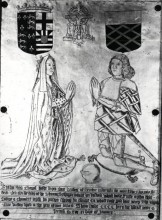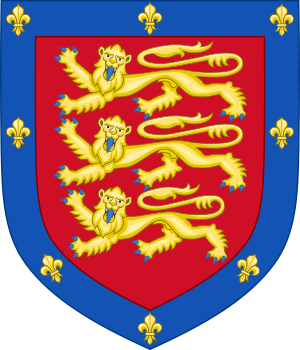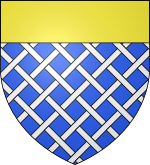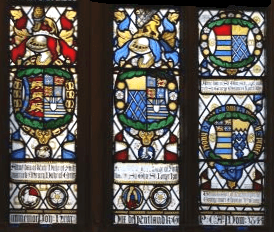Anne, Duchess of Exeter facts for kids
Quick facts for kids Anne Plantagenet |
|
|---|---|
| Duchess of Exeter | |

Anne with her second husband Thomas St Leger. Monumental brass in "St Leger Chantry" (later "Rutland Chantry"), St George's Chapel, Windsor Castle
|
|
| Born | 10 August 1439 Fotheringhay, Northamptonshire, England |
| Died | 14 January 1476 (aged 36) |
| Burial | 1 February 1476 St Leger Chantry, St. George's Chapel, Windsor |
| Spouse | Henry Holland, 3rd Duke of Exeter Thomas St. Leger |
| Issue | Lady Anne Holland Anne St. Leger, Baroness de Ros |
| House | York |
| Father | Richard Plantagenet, 3rd Duke of York |
| Mother | Cecily Neville |
| Religion | Roman Catholicism |
Anne of York, Duchess of Exeter, also known as Anne Plantagenet (born August 10, 1439 – died January 14, 1476), was an important figure in English history. She was the first child of Richard Plantagenet, 3rd Duke of York, and Cecily Neville. This made her the older sister of two English kings: Edward IV (who ruled from 1461 to 1483) and Richard III (who ruled from 1483 to 1485). She also had other siblings, including Edmund, Earl of Rutland, Elizabeth of York, Duchess of Suffolk, Margaret, Duchess of Burgundy, and George Plantagenet, 1st Duke of Clarence.
Anne's Marriages
Anne was married two times during her life. She also ended her first marriage through a divorce.
First Marriage
In 1447, when Anne was just eight years old, she married Henry Holland, 3rd Duke of Exeter (1430–1475). This was a time of great conflict in England called the Wars of the Roses. These wars were fought between two powerful families: the House of Lancaster and the House of York. Anne's family was the House of York, but her husband, Henry Holland, chose to support the House of Lancaster.
Henry Holland was a military leader for the Lancastrians. He fought in important battles like the Battle of Wakefield and the Second Battle of St Albans, where the Lancastrians won. He also fought in the Battle of Towton, where the Lancastrians lost. After this defeat, he had to flee to Scotland and then joined Queen Margaret of Anjou in France.
On March 4, 1461, Anne's younger brother, Edward, Duke of York, became King Edward IV. Because Henry Holland had fought against the new king, his lands and titles were taken away. However, King Edward IV gave these lands to Anne, with the plan that their daughter, Anne Holland, would inherit them later.
Anne and Henry separated in 1464 and officially divorced in 1472. During a time when King Henry VI briefly returned to power, Anne stayed loyal to her brother Edward. She played a part in convincing her brother George, Duke of Clarence, to stop supporting the Lancastrians. Her efforts helped Edward get his throne back.
Anne and Henry Holland had one daughter named Anne Holland (born 1461). This daughter married Thomas Grey, Lord Astley, in 1466. Thomas Grey was the son of King Edward IV's wife, Elizabeth Woodville, from her first marriage. Sadly, Lady Astley died young, sometime between 1467 and 1474, and she did not have any children.
Second Marriage
Around 1474, Anne married for the second time to Thomas St. Leger (who lived from about 1440 to 1483). Thomas St. Leger was a very loyal supporter of Anne's brother, King Edward IV.
After King Edward IV died, his younger brother, Richard III, became king. Thomas St. Leger took part in a rebellion against King Richard III, led by the Duke of Buckingham. When this rebellion failed, Thomas St. Leger was put to death in 1483.
In 1476, King Edward IV had made a special rule about the lands that belonged to Anne's first husband. He said that these lands would go to Anne and any children she might have in the future. This meant that if she remarried, her new children could inherit these important estates.
Anne died while giving birth to her only daughter with Thomas St. Leger. This daughter was named Anne St. Leger (born January 14, 1476 – died April 21, 1526). Because of the special rule made by King Edward IV, Anne St. Leger inherited the lands from her mother's first husband, Henry Holland. Anne St. Leger later married George Manners, 11th Baron de Ros. They had a son named Thomas Manners, 1st Earl of Rutland, who became a favorite of the royal family.
Death and Burial
Anne died on January 14, 1476, and was buried on February 1, 1476. She was laid to rest in a special chapel called the St Leger Chantry. This chapel is part of St. George's Chapel, Windsor Castle. Her second husband, Thomas St. Leger, founded this chapel in 1481. It was later renamed the Rutland Chantry. This was to honor her son-in-law, George Manners, 11th Baron de Ros, whose statue (along with his wife Anne St Leger's) is in the chapel. George Manners was the father of Thomas Manners, 1st Earl of Rutland.
See also
 In Spanish: Ana de York para niños
In Spanish: Ana de York para niños
 | Bayard Rustin |
 | Jeannette Carter |
 | Jeremiah A. Brown |




